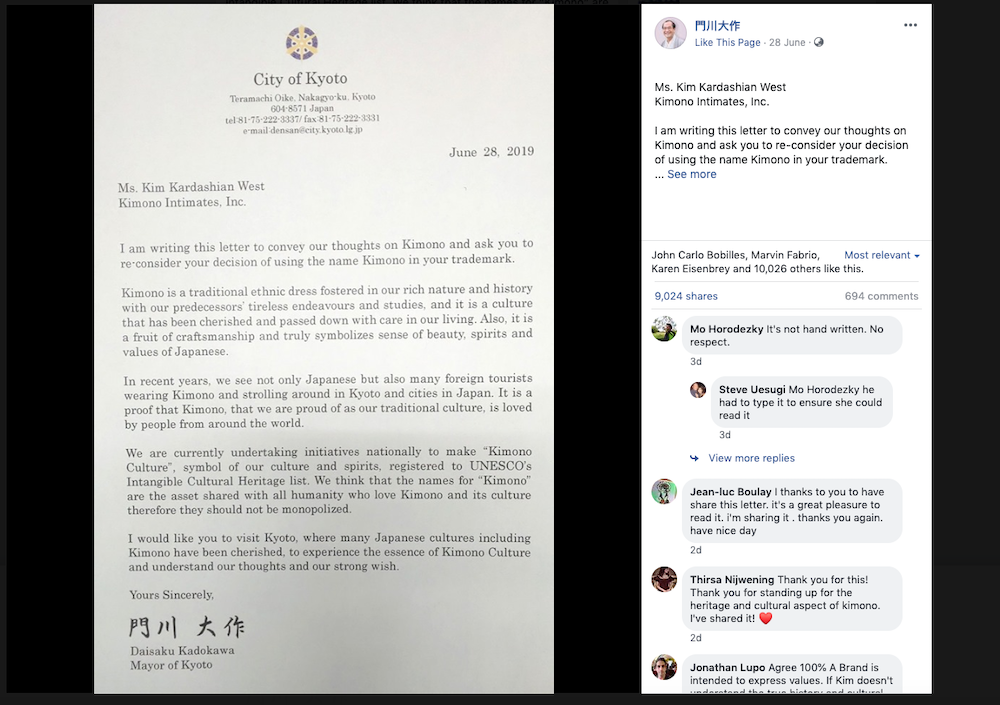Kim Kardashian West just announced, via Twitter and Instagram, that she would be renaming her shape wear line after all the backlash that it received over the course of the past week.
When Kardashian West launched her shape-wear (or solution-wear as she refers to it) line, originally called Kimono, it was met with immediate criticism and accusations of cultural appropriation. People were quick to point out that the word “kimono” is Japanese and refers to a wide variety of garments worn by both men and women. The name literally translates to garments. What it does not refer to, is any form of underwear. There were outcries from Japanese citizens as well as Japanese Americans, who believed that the adoption of the word was cultural appropriation. Some thought that if a major celebrity like Kardashian West were to use the word to refer to something else entirely than what it was meant for, she could possibly disassociate the word from its native culture and language.
Dear @KimKardashian Kimono is our precious culture that means so much to us than you think. This is Kimono that our heart belongs to. You disrespect not only us but our Japanese ancestors who preserved kimonos today. Reconsider the name, please. #KimOhNo
#Kimono
pic.twitter.com/34Hnd2mmcn— Saki (@sakijapanesegal) June 29, 2019
This sparked the viral hashtag #KimOhNo which people used to voice their concerns as well as showcase what a kimono actually was in Japanese culture. There was even greater backlash when it was reported that Kardashian West had filed a trademark for the word Kimono in the stylised font that was, initially, the logo for the line drawn by her husband Kanye West. She had also filed a trademark for Kimono Body and Kimono World. According to the New York Times, she applied for a total of eight trademarks, all of which are variations referring to the line. While this would not mean that she would own copyright over the actual word itself, it did nonetheless garner more negative reactions. Including a letter from the Mayor of Kyoto, one of Japanese’s oldest cities, released on the 28th of June 2019.

Daisaku Kadokawa, Mayor of the city on the island of Honshu, released an official statement, via the official Kyoto city website as well has his facebook account, where he asked Kardashian West to “reconsider (her) decision of using the name Kimono in (her) trademark”. The letter, available in English and Japanese, goes on to explain the significance of the Kimono in Japanese culture and how its use has extended beyond just the Japanese public.
According to the letter, it appears that Japanese officials are, “currently undertaking initiatives nationally to make ‘Kimono Culture’, symbol of our culture and spirits, registered to UNESCO’s Intangible Cultural Heritage list. We think that the names for ‘Kimono’ are the asset shared with all humanity who love Kimono and its culture therefore they should not be monopolised”. Whether this is being done by the city of Kyoto, the Kyoto Prefecture or Japan as a whole is not clear, but the message was heard loud and clear. The following Monday, Kardashian West announced that she would be renaming her line.
My brands and products are built with inclusivity and diversity at their core and after careful thought and consideration, I will be launching my Solutionwear brand under a new name. I will be in touch soon. Thank you for your understanding and support always.
— Kim Kardashian West (@KimKardashian) July 1, 2019
In the Tweet, she mentioned that “inclusivity and diversity” were what the line formerly known as Kimono was built around, a statement she had also made earlier to the New York Times, back when she claimed that she did not have any plans to change the name. For her, it was a play on her own name Kim, something that she has done with some of her other brands like the Kimoji and KKW Beauty. It appears that the letter from a government official may have prompted her to make this change.
This is not the first time in 2019 that governments have gotten involved in matters relating to cultural appropriation. According to reports, Mexico’s Secretary of Culture Alejandra Frausto also criticised Venezuelan fashion house Carolina Herrara in June for using designs that originate from indigenous Mexican peoples. In a letter seen by El Pais, a Spanish language newspaper, she asked Wes Gordon, the Creative Director for the label, why he chose to use patterns and motifs that are prevalent in certain Mexican communities. The Resort 2020 Collection that she was referring to has already been accused of cultural appropriation and plagiarism.
Both cases have seen official statements being made by government officials as well as details of actions that are being taken. In Kyoto that means approaching UNESCO and for Mexico, that meant attending the El Foro-Encuentro Internacional La Protección del Patrimonio Cultural (The International Forum-Meeting The Protection of Cultural Heritage) and going over ways to protect indigenous communities against cultural plagiarism. The question of cultural appropriation has already become a topic that is prevalent when discussing identity politics- especially when it comes to African American Civil Rights movements. However, it only incredibly recently that we are actually seeing politicians being involved in this issues. Indeed, for many communities, their cultural heritage is extremely important. Maybe now even politicians are realising, in the words of Frausto, “This is a matter of ethical consideration that obliges us to speak out and bring an urgent issue to the UN’s sustainable development agenda: promoting inclusion and making those who are invisible visible”.






